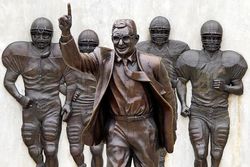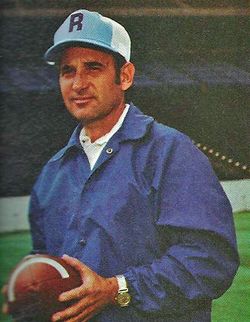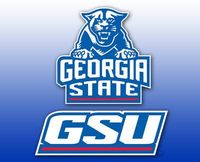
The penalties imposed today on Penn State are in keeping with that mission, and while Pennsylvania is a northern state they will resonate most in the south. The last decade has seen an incredible football money chase, accelerating every year, and to say that any football program in the Southeastern Conference is subservient to its academic masters is a gross lie.
I hear it on sports talk stations all the time. What does President (Insert Name Here) know? How dare he criticize Coach (thus and so). Or when an honest coach with a losing record is fired, what's the message there? Just win, baby. And the boosters nod in sympathy.

Coach Lou Holtz, by contrast, had it right. “College football is way too big. Coach's salaries are out of line.” But Holtz was never “just” a football coach. (Of course we thought that was true of Paterno.)
The people who wrap their lives around college football, who pore over lists of recruits like Kremlinologists, and who throw their hard-earned dollars into “seat licenses” and other gimmicks for ever-larger football palaces, they're the real enablers here. We created Joe Paterno. He never went into football expecting, or wanting to be, that guy. That he was seduced into becoming that guy tells you everything you need to know about the level of corruption, and temptation, in the sport.
It can get to anyone.

Rice had done something incredible to remain competitive in football. It desegregated, even breaking the founder's will in order to do that. But, as I found in researching my first feature story for the “Sallyport” alumni magazine, called “The View from the Stadium” in 1975, the kids who played football were alienated from the rest of the university's life. I don't know what the big oil alums were doing for some of these guys, but everyone on campus knew it was wrong, and that it couldn't go on.
So in 1976, before my senior year, we did something about it. We hired a man named Homer Rice (right). He wasn't just a football man. He was an educator. He promised to put in a “Total Person Program” to integrate football into the life of the school, and to focus, not just on mere compliance with the rules, but with the intent behind them.
Dr. Rice was hired away two years later – believe it or not to coach the NFL's Cincinnati Bengals – but the lesson remained, and endures. Football is no longer bigger than the school. We hired a succession of coaches who understood that, and we tolerated it when they had losing records. Watson Brown went 0-11 and got hired away by Vanderbilt. Jerry Berndt went 0-11 and got hired back by Penn. Fred Goldsmith won 5 games one year and was hired away by Duke. Ken Hatfield was competitive most years, and quit only after claiming he'd never had a gay football player under his watch – we knew that wasn't right.

That's the culture. That is what has to change. It's not just about what Joe Paterno was told, what Sandusky did, it's not just about child predators. It's about the relationship between athletics and what universities are supposed to be about, which is education.

Until the tail stops wagging the dog, until all programs are like the one Joe Paterno arrived at in 1957, not the one he left in 2011, the work can't stop.
If it does, then Paterno's legacy, and his lesson, become even-more tarnished. Not before.









